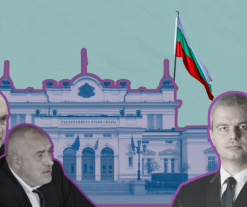Bulgaria Monthly Digest: crackdown on the far-right, and COVID hits Bulgaria5 min read
– Approximately 200 far-right supporters gathered in downtown Sofia on February 22nd after Bulgaria’s Supreme Administrative Court upheld the city mayor’s ban on their annual torchlight procession honouring Hristo Lukov, a Bulgarian general who led a pro-Nazi organization in the 1930s and 1940s. Held every February since 2003, the Lukov March – which attracts right-wing extremists from all over Europe – has been repeatedly banned by Sofia in recent years, but until now the prohibition had not been backed by the Court. This year Lukov’s followers were restricted to the laying of wreaths at the house where the general was killed. A few hundred people gathered on the same day at a counter-demonstration under the motto “No Nazis on the streets” in central Sofia.
– A few days earlier, on February 18th, Emil Krumov, a member of the far-right Bulgarian National Union which organizes the march, was buried in Pernik. He shot himself at the headquarters of the State Agency for National Security , where he had allegedly been called in to answer questions about the march.

Part of the “arsenal” found in Krumov’s apartment decorated with a portrait. Source: Prosecutor’s Office
– On February 27th, the Academic Council of Sofia University decided to strip four individuals of their honorary degrees received in 1939 and 1940. Hans Frank, Bernhard Rust, Ewald von Massow, and Eduard Kohlrausch were all affiliated with the Nazi regime in Germany when they were awarded doctor honoris causa titles for the occasion of Sofia University’s 50th anniversary.
– Bulgarian Prime Minister Boyko Borissov failed on March 2nd in his mediation mission in Ankara which aimed to bring Greece, Turkey, and EU leaders to a summit in Sofia to prevent a new refugee crisis in Europe, Euractiv reports. However, after meeting with President Recep Tayyip Erdoğan, Borissov claimed that he had ensured “zero [migrant] pressure” at the Bulgarian border and thanked Turkey for “keeping its commitment” to the deal with the EU (with regards to Bulgaria at least).
While thousands of migrants were stuck between Turkey and Greece, the situation at Bulgaria’s border remained unchanged. Some believe this might be compensation for the favours Borissov has been doing for Erdoğan such as forcible repatriating Turkish dissidents who had sought asylum in Bulgaria. Another reason could be the brutality of the Bulgarian border police. An Afghan migrant looking for a way to leave Turkey told bTV: “Many of my friends left for Europe and they told us – don’t pass through Bulgaria, because they are very cruel […] The police beat the migrants a lot”.
“We met here not only a friend with Prime Minister Boyko Borissov, but also a true European” Ursula von der Leyen, President of the European Commission, said before the media following her visit to Sofia with the President of the European Council, Charles Michel, visit to Sofia on March 3rd. The European leaders traveled to both Bulgaria and Greece that day to “show support” for the two counties and to announce financial help for Athens for the protection of “Europe’s borders”. “We understand very well all the huge efforts you made and you are making in order to maintain the high level of protection of the borders, which is important for European security.” Michel said in his statement in Sofia.
– Sofia has agreed to a 40% cut in the price of natural gas it imports from Russia, its dominant gas supplier, the government announced on March 3rd. Bulgaria, which relies on Russian imports for more than 80% of its gas needs, is the last of eight Eastern European countries to agree to a price cut after the EU sealed an antitrust agreement with Gazprom in 2018.
– More than 33% of children in Bulgaria are at risk of poverty or social exclusion, new Eurostat data from March 5th show. Bulgaria has the highest share in the EU after Romania (381 %) Children are the age group with the highest risk of poverty or social exclusion rates in nearly half of the EU member states.
– Five nurses spent the night of March 6th in one of the buildings of the Bulgarian National Assembly in protest of humiliating wages and miserable working conditions . They went to the parliament hoping to meet the Minister of Healthcare, but he later appeared to be absent from the scheduled meeting of the Parliamentary Health Committee. Following the several-minutes-long meeting and an unsuccessful dialogue, the nurses decided to remain in one of the halls until their voices were heard. After 30 hours “in barricade”, live streaming from inside and outside, and tensions with security personnel on the ledge of the building, the protesters left the parliament exhausted and disappointed. Medical workers in Bulgaria have been protesting for over a year. For the last 20 years the number of nurses in the country has decreased by 30 000 and there are many nurses working for salaries amounting to less than 300 euros a month.
– Amid the COVID-19 emergency in Bulgaria, on March 16th, the mayor of Nova Zagora Nikolai Grozev announced that authorities would impose a police checkpoint at the entrance to the Shesti neighborhood where around 10 000 Roma live. A significant share of the neighborhood does not have access to running water and sewerage. That is the only place in Bulgaria where such measures have been taken despite the state of emergency declared in the country. By March 19th there were 94 confirmed cases of and 3 deaths from COVID-19 in Bulgaria.







